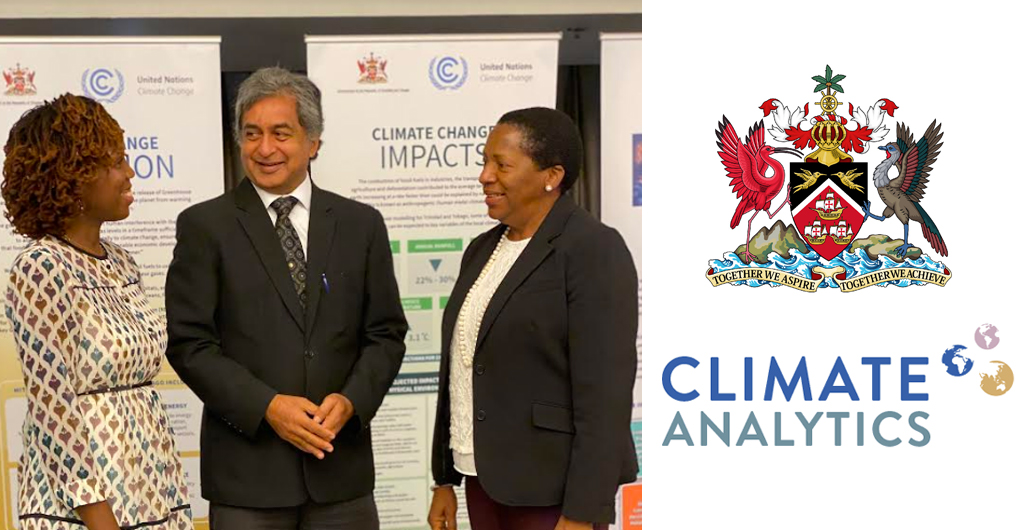T&T advances National Climate priorities with inaugural pre-COP conference
Ahead of this year’s pivotal climate change talks, to take place in Egypt at COP27, the Government of the Republic of Trinidad and Tobago has engaged in a milestone national Pre-COP Consultation. The workshop, entitled “Prelude to COP27: How Trinidad and Tobago Can Lead the Region In Raising Resiliency”, took place on Wednesday, 26th October and was led by the Honourable Pennelope Beckles, Minister of Planning and Development.
The Ministry of Planning and Development workshop was presented in collaboration with the United Nations Development Programme (UNDP) and Climate Analytics Caribbean. It was attended by government officials and representatives of civil society, environmental institutions, and private enterprises.
COP27 will bring leaders from 197 nations and territories together in Sharm-El-Sheikh, Egypt, from November 6th – 18th to meet as the Conference of the Parties (COP) to the United Nations Framework Convention on Climate Change (UNFCCC). The decisions and agreements will determine the way forward for the world on critical issues related to combating climate change and limiting global temperature increase to 1.5°C.
As a small island developing State, Trinidad and Tobago is considered a country that is among the world’s most vulnerable to severe climate change impacts. Of particular concern for this country at COP27 will be the role of just transition in implementing decisions, mitigation, adaptation, climate finance, and loss and damage.
“For Trinidad and Tobago, the decisions to be taken at this COP must help us to further our own national implementation efforts to tackle the climate crisis,” said the Honorable Pennelope Beckles, Minister of Planning and Development. “We are advancing our national efforts with targeted adaptation interventions as well as initiatives such as increasing fines for illegal timbering and oil pollution. These are complemented by incentives for renewable energy expansion and the construction of the 112-megawatt solar photovoltaic system, which is set to begin next year. We are also finalizing a just transition policy that will ensure that Trinidad and Tobago can benefit fully from the inevitable global energy transition whilst ensuring that none of our citizens is left behind.”
“Our discussions today will put us in good stead to ensure that the national delegation to the Conference can secure tangible benefits to Trinidad and Tobago in line with national priorities,” she added.
Topics discussed at the consultation included:
- Current climate science and its impacts on Trinidad and Tobago
- Introduction to the UNFCCC and the Paris Agreement, and an overview of COP26 outcomes (Glasgow Pact) and current state of play
- Issues to be discussed at COP 27 and expected outcomes, including those arising from the Glasgow Pact
- Implementing Trinidad and Tobago’s Climate Change Agenda: The role of the Just Transition Policy
Ms. Rueanna Haynes, Director of Climate Analytics Caribbean, who has been assisting the Ministry of Planning and Development with the Just Transition Plan noted the importance of accelerating Just Transition to safeguard societal welfare and achieve climate goals.
“This national consultation has been imperative to creating an informative platform to bring the critical climate issues affecting us as a small island developing State to the fore,” Haynes added. “We look forward to taking these issues to the global community at COP27 and working to achieve decisions that redound to the benefit of Trinidad and Tobago and our vulnerable region.”
About Climate Analytics Caribbean:
Climate Analytics was formed in 2008 to help achieve a climate-safe, sustainable future for all.
We deliver cutting-edge scientific analysis and support to accelerate climate action to limit warming below 1.5°C. Our work empowers countries, communities, and people at the front of the climate crisis.
Climate Analytics Caribbean is based in Trinidad and Tobago. It aims to significantly augment the scientifically informed, knowledge-based resources that Small Island Developing States (SIDS) and Least Developed Countries (LDCs) in the region require to effectively counter the effects of climate change.



